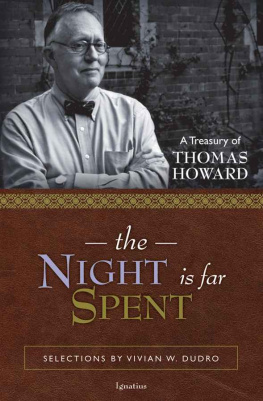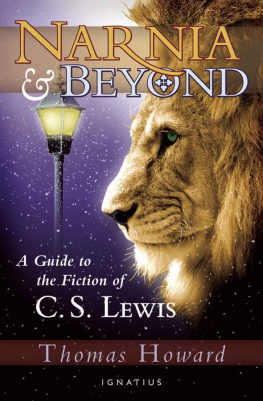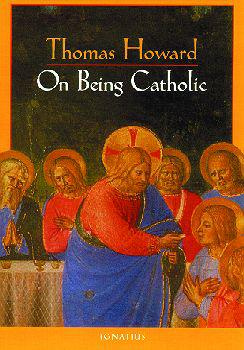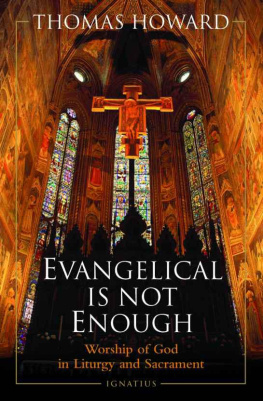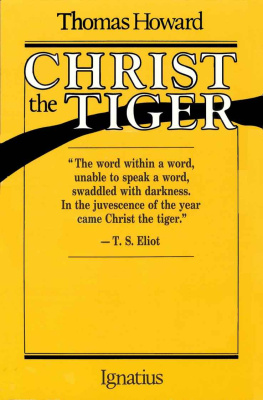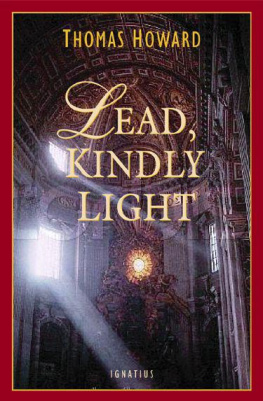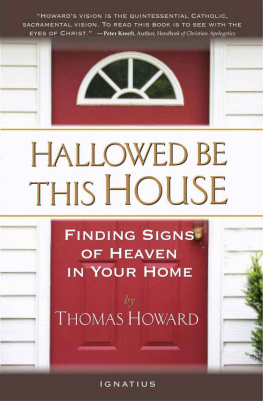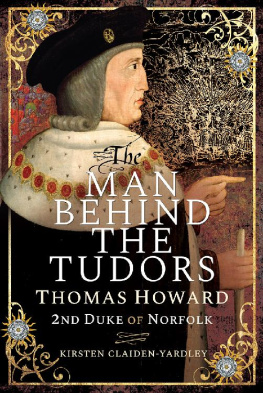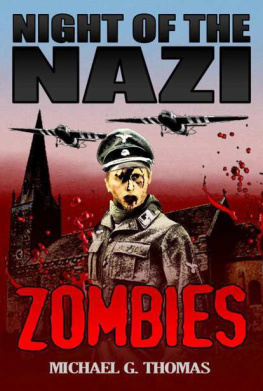Thomas Howard - The Night Is Far Spent
Here you can read online Thomas Howard - The Night Is Far Spent full text of the book (entire story) in english for free. Download pdf and epub, get meaning, cover and reviews about this ebook. year: 2010, publisher: Ignatius Press, genre: Romance novel. Description of the work, (preface) as well as reviews are available. Best literature library LitArk.com created for fans of good reading and offers a wide selection of genres:
Romance novel
Science fiction
Adventure
Detective
Science
History
Home and family
Prose
Art
Politics
Computer
Non-fiction
Religion
Business
Children
Humor
Choose a favorite category and find really read worthwhile books. Enjoy immersion in the world of imagination, feel the emotions of the characters or learn something new for yourself, make an fascinating discovery.
- Book:The Night Is Far Spent
- Author:
- Publisher:Ignatius Press
- Genre:
- Year:2010
- Rating:3 / 5
- Favourites:Add to favourites
- Your mark:
- 60
- 1
- 2
- 3
- 4
- 5
The Night Is Far Spent: summary, description and annotation
We offer to read an annotation, description, summary or preface (depends on what the author of the book "The Night Is Far Spent" wrote himself). If you haven't found the necessary information about the book — write in the comments, we will try to find it.
The Night Is Far Spent — read online for free the complete book (whole text) full work
Below is the text of the book, divided by pages. System saving the place of the last page read, allows you to conveniently read the book "The Night Is Far Spent" online for free, without having to search again every time where you left off. Put a bookmark, and you can go to the page where you finished reading at any time.
Font size:
Interval:
Bookmark:
THE NIGHT IS FAR SPENT
A TREASURY OF THOMAS HOWARD
Selected by Vivian W. Dudro
IGNATIUS PRESS SAN FRANCISCO
All Scripture quotations are from the
King James Version of the Bible
unless otherwise noted.
Cover photograph by Richard Livingston
Cover design by John Herreid
2007 Ignatius Press, San Francisco
All rights reserved
ISBN 978-1-58617-132-2
ISBN 1-58617-132-1
Library of Congress Control Number 2005929141
Printed in the United States of America
THINGS LITERARY AND LITERARY MEN
THINGS SACRED
EXISTING THINGS: SELF, SOCIETY, GOD
W hen I was a small boy my mother used to sing a certain song to me as she had done for all of my older brothers and sisters. It went this way:
Hush my baby, do not cry,
Five brave knights go riding by.
One is dressed in bonny blue,
Hes the leader strong and true.
One in crimson bright is dressed,
With a star upon his breast....
That song represents my own earliest experience of the power of narrative. To this day some chord is struck in the depths of my being by those words. The picture conjured in my imagination is of a very dark forest of conifers at twilight, and of the knights approaching across a green meadow toward a castle where I watch them from an open casement window of leaded glass and stone mullions.
Something was awakened in me by those wordssome capacity to yearn, I think, for purity, and for courtesy, and for fidelity and valor and gentility, and also, perhaps, some notion that mystery arches over our little life like the crepuscular light suffusing that scene.
There is a strange power in words to call to us mortals, and to summon us, as it were. Anyone who has ever himself been a child to whom stories were read or sung knows that the whole point of stories, from Peter Rabbit to War and Peace , is to summon us.
Summon us to what? The answer here would lie along some such line as this, surely, that all words, spoken or written, have as their task to call us from mere silence and solitude to some sort of participation in the real world. The first words spoken to us by our mothers and fathers when we are mere burbling infants, have everything to do with introducing us into this world of other selves, and of food and drink and play and love and relationships, as over against the solitude and tranquility and repose and safety and silence of the only world we have ever known up until then, namely, the womb. And the first words we attempt, even our shrieks in the delivery room, acknowledge that we are not alone. There is something out there.
But do not Peter Rabbit and War and Peace summon us away from reality and off into an imaginary world? To be sure, Tolstoys vast work is about the real world, if by that we mean Russia in the time of Napoleon, but for us now, that world is not much closer to our ordinary circumstances than is Peter Rabbits. We do not often find ourselves at glittering cotillions in cavernous ballrooms lighted by thousands of candles and waited upon by liveried footmen and studded with grand duchesses and field marshals. Actually, Peters humdrum circumstances are probably closer to our own world of errands and gardens and small disobediences than are the circumstances of Tolstoys characters.
But the objection could be raised against both of these tales, and against all fiction, that they siphon us away from present actuality and tempt us to dawdle in merely imaginary byways. It may be nice to turn from the hurly-burly of the marketplace, or from the interstate, or the office, and to relax in a bit of once-upon-a-time, but no one will argue, surely, that this represents anything more than an escape from realityperhaps even an indulgence we permit ourselves briefly before we return to our knitting, so to speak.
All of this is true. But there is also a sense in which story lies close to the center of the mystery of our existence. Mortal life is a mystery of course. What is it all about , we wonder. What are we to make of our odd situation, we who share flesh and blood with the animals, but who are hag-ridden with notions of immortality and grandeur, and who cannot ever quite accede to the sentence of certain death that hangs over us? All of us are beleaguered from time to time, especially when things are not going well, with the bald fact that, in spite of all the excellences that seem to crown our human lifeour intellect, our will, our imagination, our capacity for laughter and generosity, and our enormous achievementsin spite of all of that, our life hangs by the merest gossamer filament. Anything can snip it without a moments warning. King Lear found himself bemused by the irony that all of this grace and beauty and dignity that we call humanness should be snuffed out while mere beasts go on living. Why should a dog, a horse, a rat, have life, / And thou no breath at all? (IV, iii, 307), he asks, addressing the dead body of his beloved daughter cordelia, which he carries in his arms. Who of us has not asked some such question?
But returning to the notion that storytelling may lie close to the center, we might wonder. The serious business of life has always entailed things like earning our bread and raising our families and fighting for our country and generally attending to the business of simply keeping going. Storytelling, surely, would be out on the margin somewhere, along with dancing and playing the flute and painting pretty pictures.
But this is where we need to think twice. If we do (think twice), we will come upon an interesting thing, namely, that from the beginning of historynay, from before the centuries chronicled in what we call historical records: from the times lost in the mists of mythologywe mortals have been telling stories, and dancing, and carving, and painting, and singing. No matter what woolly mammoths and saber-toothed tigers prowled outside the cave, no matter what Huns or what Norsemen harried our gates, no matter what Black Plagues decimated our cities and what famines emptied our granariesin spite of all, we kept at it. What sort of creature are we, that, when we can scarcely keep body and soul together and find food for our childrens mouths, we have nevertheless lived our lives in the midst of song and dance, as it were?
From the christian point of view, this oddity, observable in all tribes, cultures, societies, and civilizations from the beginning, may hint that we are aware of ourselves living in a story. The formula Once upon a time is as good a formula for our own story as it is for a fairy tale. There probably has never been found a better way to begin a narrative. When you hear these words your imagination poises itself. Ahawhat will we encounter now? Will we find ourselves drawn into the affairs of a family of rabbits who lived in a wood not far from the garden of one McGregor? or will it be an ancient king whose knights pledged themselves to defend purity and virtue, some of whom saw the Holy Grail and some of whom blundered into concupiscence? Or will it be young Copperfield whose life was made miserable by the tyranny of Mr. and Miss Murdstone? Perhaps it will be scrooge who had so much to learn about generosity. Or Huckleberry Finn floating down the Mississippi on his raft, apparently detached in his soul as well as in his circumstances from the ordinary suppositions of life along the banks of that river.
The odd thing about all of these stories is that we cannot seem to get very far in them without finding our sleeves being plucked by the hint that we are reading about ourselves. Oh, we are not rabbits, to be sure, but who of us has not at some point tried disobedience as a way of getting some goody or other that did not seem promised to those who stayed in the well-trodden and lawful ruts? And we are not David Copperfield, but who of us has not known the forlornness that can overwhelm one when circumstances seem grimly marshaled against one? And we certainly are not King Arthur, but which of us has not wished that we could organize things so that greed and perfidy and treachery were banished, and purity and charity and rectitude guarded?
Next pageFont size:
Interval:
Bookmark:
Similar books «The Night Is Far Spent»
Look at similar books to The Night Is Far Spent. We have selected literature similar in name and meaning in the hope of providing readers with more options to find new, interesting, not yet read works.
Discussion, reviews of the book The Night Is Far Spent and just readers' own opinions. Leave your comments, write what you think about the work, its meaning or the main characters. Specify what exactly you liked and what you didn't like, and why you think so.

